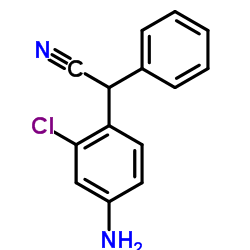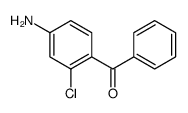(4-Amino-2-chlorophenyl)(phenyl)acetonitrile
Modify Date: 2025-09-18 15:11:33

(4-Amino-2-chlorophenyl)(phenyl)acetonitrile structure
|
Common Name | (4-Amino-2-chlorophenyl)(phenyl)acetonitrile | ||
|---|---|---|---|---|
| CAS Number | 4760-53-6 | Molecular Weight | 242.704 | |
| Density | 1.3±0.1 g/cm3 | Boiling Point | 413.3±40.0 °C at 760 mmHg | |
| Molecular Formula | C14H11ClN2 | Melting Point | 79-87ºC | |
| MSDS | N/A | Flash Point | 203.8±27.3 °C | |
| Name | 2-(4-amino-2-chlorophenyl)-2-phenylacetonitrile |
|---|---|
| Synonym | More Synonyms |
| Density | 1.3±0.1 g/cm3 |
|---|---|
| Boiling Point | 413.3±40.0 °C at 760 mmHg |
| Melting Point | 79-87ºC |
| Molecular Formula | C14H11ClN2 |
| Molecular Weight | 242.704 |
| Flash Point | 203.8±27.3 °C |
| Exact Mass | 242.061081 |
| PSA | 49.81000 |
| LogP | 2.89 |
| Vapour Pressure | 0.0±1.0 mmHg at 25°C |
| Index of Refraction | 1.634 |
Synonym: None. SECTION 2 - COMPOSITION, INFORMATION ON INGREDIENTS
Risk Phrases: 20/21/22 SECTION 3 - HAZARDS IDENTIFICATION EMERGENCY OVERVIEW Harmful by inhalation, in contact with skin and if swallowed. Potential Health Effects Eye: May cause eye irritation. Skin: May cause skin irritation. Harmful if absorbed through the skin.
Ingestion: Harmful if swallowed. Causes gastrointestinal irritation with nausea, vomiting and diarrhea. Inhalation: Harmful if inhaled. Causes respiratory tract irritation. Chronic: No information found. SECTION 4 - FIRST AID MEASURES Eyes: Flush eyes with plenty of water for at least 15 minutes, occasionally lifting the upper and lower eyelids. Get medical aid. Skin: Get medical aid immediately. Immediately flush skin with plenty of water for at least 15 minutes while removing contaminated clothing and shoes. Ingestion: Call a poison control center. If swallowed, do not induce vomiting unless directed to do so by medical personnel. Never give anything by mouth to an unconscious person. Get medical aid. Inhalation: Remove from exposure and move to fresh air immediately. If not breathing, give artificial respiration. If breathing is difficult, give oxygen. Get medical aid. Notes to Physician: SECTION 5 - FIRE FIGHTING MEASURES General Information: As in any fire, wear a self-contained breathing apparatus in pressure-demand, MSHA/NIOSH (approved or equivalent), and full protective gear. Extinguishing Media: Use foam, dry chemical, or carbon dioxide. SECTION 6 - ACCIDENTAL RELEASE MEASURES General Information: Use proper personal protective equipment as indicated in Section 8. Spills/Leaks: Vacuum or sweep up material and place into a suitable disposal container. Clean up spills immediately, observing precautions in the Protective Equipment section. SECTION 7 - HANDLING and STORAGE Handling: Wash thoroughly after handling. Wash hands before eating. Remove contaminated clothing and wash before reuse. Use only in a well-ventilated area. Do not get on skin or in eyes. Do not ingest or inhale. Storage: Store in a cool, dry place. Store in a tightly closed container. SECTION 8 - EXPOSURE CONTROLS, PERSONAL PROTECTION Engineering Controls: Use adequate general or local explosion-proof ventilation to keep airborne levels to acceptable levels. Exposure Limits CAS# 4760-53-6: Personal Protective Equipment Eyes: Wear appropriate protective eyeglasses or chemical safety goggles as described by OSHA's eye and face protection regulations in 29 CFR 1910.133 or European Standard EN166. Skin: Wear appropriate protective gloves to prevent skin exposure. Clothing: Wear appropriate protective clothing to prevent skin exposure. Respirators: Follow the OSHA respirator regulations found in 29 CFR 1910.134 or European Standard EN 149. Use a NIOSH/MSHA or European Standard EN 149 approved respirator if exposure limits are exceeded or if irritation or other symptoms are experienced. SECTION 9 - PHYSICAL AND CHEMICAL PROPERTIES Physical State: Solid Color: Not available. Odor: Not available. pH: Not available. Vapor Pressure: Not available. Viscosity: Not available. Boiling Point: Not available. Freezing/Melting Point: Not available. Autoignition Temperature: Not available. Flash Point: Not available. Explosion Limits, lower: Not available. Explosion Limits, upper: Not available. Decomposition Temperature: Solubility in water: Specific Gravity/Density: Molecular Formula: C14H11ClN2 Molecular Weight: 242.71 SECTION 10 - STABILITY AND REACTIVITY Chemical Stability: Stable under normal temperatures and pressures. Conditions to Avoid: Incompatible materials. Incompatibilities with Other Materials: Strong oxidizing agents. Hazardous Decomposition Products: Hydrogen chloride, carbon monoxide, oxides of nitrogen, carbon dioxide. Hazardous Polymerization: Has not been reported. SECTION 11 - TOXICOLOGICAL INFORMATION RTECS#: CAS# 4760-53-6: CY1692900 LD50/LC50: CAS# 4760-53-6: Oral, mouse: LD50 = >500 mg/kg. Carcinogenicity: 4-Amino-2-chlorodiphenylacetonitrile - Not listed by ACGIH, IARC, or NTP. Other: See actual entry in RTECS for complete information. SECTION 12 - ECOLOGICAL INFORMATION SECTION 13 - DISPOSAL CONSIDERATIONS Dispose of in a manner consistent with federal, state, and local regulations. SECTION 14 - TRANSPORT INFORMATION IATA Not regulated as a hazardous material. IMO Not regulated as a hazardous material. RID/ADR Not regulated as a hazardous material. SECTION 15 - REGULATORY INFORMATION European/International Regulations European Labeling in Accordance with EC Directives Hazard Symbols: XN Risk Phrases: R 20/21/22 Harmful by inhalation, in contact with skin and if swallowed. Safety Phrases: S 36/37 Wear suitable protective clothing and gloves. WGK (Water Danger/Protection) CAS# 4760-53-6: No information available. Canada None of the chemicals in this product are listed on the DSL/NDSL list. CAS# 4760-53-6 is not listed on Canada's Ingredient Disclosure List. US FEDERAL TSCA CAS# 4760-53-6 is not listed on the TSCA inventory. It is for research and development use only. SECTION 16 - ADDITIONAL INFORMATION MSDS Creation Date: 2/08/1999 Revision #2 Date: 12/03/2002 The information above is believed to be accurate and represents the best information currently available to us. However, we make no warranty of merchantability or any other warranty, express or implied, with respect to such information, and we assume no liability resulting from its use. Users should make their own investigations to determine the suitability of the information for their particular purposes. In no way shall the company be liable for any claims, losses, or damages of any third party or for lost profits or any special, indirect, incidental, consequential or exemplary damages, howsoever arising, even if the company has been advised of the possibility of such damages. SECTION 16 - ADDITIONAL INFORMATION N/A |
| Precursor 0 | |
|---|---|
| DownStream 1 | |
| HS Code | 2926909090 |
|---|---|
| Summary | HS:2926909090 other nitrile-function compounds VAT:17.0% Tax rebate rate:9.0% Supervision conditions:none MFN tariff:6.5% General tariff:30.0% |
| einecs 225-298-1 |
| (4-Amino-2-chlorophenyl)(phenyl)acetonitrile |
| Benzeneacetonitrile, 4-amino-2-chloro-α-phenyl- |
| MFCD00066975 |
 CAS#:61747-12-4
CAS#:61747-12-4